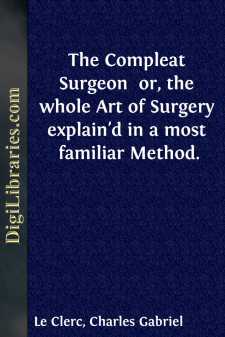Categories
- Antiques & Collectibles 13
- Architecture 36
- Art 48
- Bibles 22
- Biography & Autobiography 813
- Body, Mind & Spirit 142
- Business & Economics 28
- Children's Books 17
- Children's Fiction 14
- Computers 4
- Cooking 94
- Crafts & Hobbies 4
- Drama 346
- Education 46
- Family & Relationships 57
- Fiction 11829
- Games 19
- Gardening 17
- Health & Fitness 34
- History 1377
- House & Home 1
- Humor 147
- Juvenile Fiction 1873
- Juvenile Nonfiction 202
- Language Arts & Disciplines 88
- Law 16
- Literary Collections 686
- Literary Criticism 179
- Mathematics 13
- Medical 41
- Music 40
- Nature 179
- Non-Classifiable 1768
- Performing Arts 7
- Periodicals 1453
- Philosophy 64
- Photography 2
- Poetry 896
- Political Science 203
- Psychology 42
- Reference 154
- Religion 513
- Science 126
- Self-Help 84
- Social Science 81
- Sports & Recreation 34
- Study Aids 3
- Technology & Engineering 59
- Transportation 23
- Travel 463
- True Crime 29
The Compleat Surgeon or, the whole Art of Surgery explain'd in a most familiar Method.
Description:
Excerpt
C H A P. I.
Who is a Surgeon?
A Person skill'd in curing Diseases incident to Humane Bodies by a methodical Application of the Hand.
What are the Qualifications of a good Surgeon in general?
They are three in Number: viz. Skill in the Theory, Experience in the Practical part, and a gentle Application of the Hand.
Why ought a Surgeon to be skilful?
Because without a discerning Faculty he can have no certainty in what he doth.
Why must he be experienc'd?
Because Knowledge alone doth not endue him with a dexterity of Hand requisite in such a Person, which cannot be acquir'd but by Experience, and repeated Manual Operations.
Why must he be tender-handed?
To the End that by fit Applications he may asswage those Pains which he is oblig'd to cause his Patients to endure.
What is Chirurgery or Surgery?
It is an Art which shews how to cure the Diseases of Humane Bodies by a methodical Manual Application. The Term being derived from the Greek Word Χεὶρ, signifying a Hand and á¼Åργον, a Work or Operation.
After how many manners are Chirurgical Operations usually perform'd?
Four several ways.
Which be they?
I. Synthesis, whereby the divided Parts are re-united; as in Wounds. II. Diæresis, that divides and separates those Parts, which, by their Union, hinder the Cure of Diseases, such is the continuity of Abscesses or Impostumes which must be open'd to let out the purulent Matter. III. Exæresis, which draws out of the Body whatsoever is noxious or hurtful, as Bullets, Arrows, &c. IV. Prosthesis adds some Instrument or Body to supply the defect of those that are wanting; such are Artificial Legs and Arms, when the Natural ones are lost. It also furnishes us with certain Instruments to help and strengthen weak Parts, such as Pessaries, which retain the Matrix in its proper place when it is fallen, Crutches to assist feeble Persons in going, &c.
What ought to be chiefly observed before the undertaking an Operation?
Four things; viz. 1. What the Operation to be perform'd is? 2. Why it is perform'd? 3. Whether it be necessary or possible? And 4. The manner of performing it.
How may we discern these?
The Operation to be perform'd may be known by its Definition; that is to say, by explaining what it is in it self: We may discover whether it ought to be done, by examining whether the Distemper cannot be cur'd otherwise: We may also judge whether it be possible or necessary, by a competent Knowledge of the Nature of the Disease, the Strength of the Patient, and the Part affected: Lastly, the manner of performing it may be found out, by being well vers'd in the Practice of Surgery.
What are the Fundamental Principles of Surgery?
They are Three in number: viz. 1. The knowledge of Man's Body. 2. That of the Diseases which require a Manual Operation. 3. That of proper Remedies and Helps upon every Occasion.
How may one attain to the Knowledge of Humane Bodies?
By the study of Anatomy.
How may one learn to know the Distempers relating to Surgery, and the Remedies appropriated for them...?


